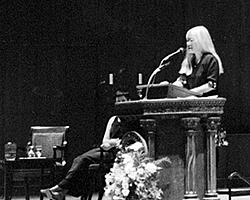

Last Wednesday evening in Finney Chapel, the all campus Convocation combined music and many words of wisdom to welcome students to campus.

The Convocation began in Finney Chapel with an opening prayer led by Oberlin Catholic Chaplain Edward Kordas.
Oberlin Piano Professer Haewon Song and Piano Professer Robert Shanon then combined their talents into a duet performance of Antonin Dvorak's brief yet highly motivated Slavonic Dance op. 72, No. 1 in B major. The audience responded enthusiastically to the performance.
President Nancy Dye presented a welcoming speech and introduced Senior Class President Nicole Johnston. Johnston spoke of the importance of extra curricular activities and being involved in the community. "Doing well in the classroom is not enough. Be actively involved outside of the classroom as well."
Both Dye and Johnston introduced and welcomed Keynote speaker Maxine Hong Kingston in her address: "Another Book of Peace."
Kingston, a tenured Asian American English professer at the University of Berkely, focused her speech around her 943-page novel titled The Fifth Book of Peace, which she is currently in the process of revising.
Kingston is most well known for The Woman Warrior: Memoirs of a Girlhood Among Ghosts, her 1976 novel that gained both public recognition and literary acclaim. Both The Woman Warrior and China Men, its sequel, are semi-fictional explorations of her cultural past. Her first fiction novel was called Tripmaster Monkey: His Fake Book, and The Fifth Book of Peace will be its sequel.
Kingston explained the different attempts to erase history within China. At the change of each dynasty library books were "burned to erase the history" of that previous era. She also spoke of historians whose "tongues were cut out" so that new dynasties could start afresh, without a past.
On a previous visit to China, Kingston learned that three books of peace were burned during early Chinese history. "These books have been with me always," she said.
In an attempt to recover these lost books she began writing a novel The Fourth Book of Peace. However the unfinished novel was destroyed in a fire alongside her house and belongings. Despite her devastating loss, she remained determined to complete a book of peace and went on to write another novel titled The Fifth Book of Peace.
While reading an excerpt from her novel, Kingston described the sensitive writing community of war veterans and their families who draws many of their ideas from the practice of Zen Buddhism. She also explained the lessons in the importance of silence, of meditation, and of "deep listening." She feels this practice "pulls the stories" out of the teller.
In her writing, Kingston has often pursued the truth of the past by combining personal experience, family experiences and stories, cultural history, myth, and imagination to arrive at her stories.
Kingston spoke of the weapons she has developed on her journey towards peace. While working towards such an overwhelming goal, she has found strength in "the written word" and in "building a community."
Kingston: Maxine Hong Kingston delivered this semester's opening convocation on Wednesday. (photo by Heidi Good)
Copyright © 1998, The Oberlin Review.
Volume 127, Number 1, September 4, 1998
Contact us with your comments and suggestions.